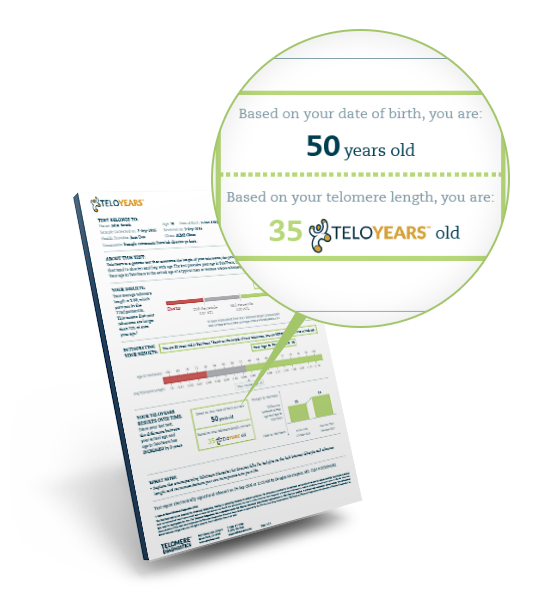Inside all your cells, at the ends of your DNA are protective caps called telomeres. They shorten with age. But can also change with certain lifestyles, both good and bad.
You should know that there are steps you can take to help slow down the clock on the aging process. But if you don't measure it, you can't manage it

The Nobel Prize in Medicine for breakthrough discoveries in Telomere Biology was awarded in 2009 to one of the founders of the company now providing TeloYears. No other DNA test has had more prestigious scientific research supporting its development.
Learn more about Telomere Science
We are the world's only lab to successfully publish the analytical validation of our telomere test method in a peer reviewed scientific journal. See the article here.
Your age in TeloYears is based on the length of your telomeres, the dynamic, protective caps on the ends of your DNA strands that tend to shorten with age, but also change with certain lifestyles both good and bad.
Your telomeres matter because they enable your cells to reproduce so you can heal, grow, and thrive. But every time your cells divide, a tiny bit of your telomeres are used up as they protect your genetic information. Years of clinical data support the link between telomere length and the aging process.
Your telomere analysis is performed in our own US laboratory, which has been inspected & certified to comply with standards under the Clinical Laboratory Improvement Amedments of 1988. A CLIA-certified lab must meet high quality standards, including qualifications for staff who perform the test & process controls to ensure accurate, reliable results.
Watch & learn how our lab uses your sample to measure your telomeres.
This guide highlights and summarizes research about the impact of what we eat on telomere length and aging.
Give the gift of TeloYears to friends and family this holiday season.